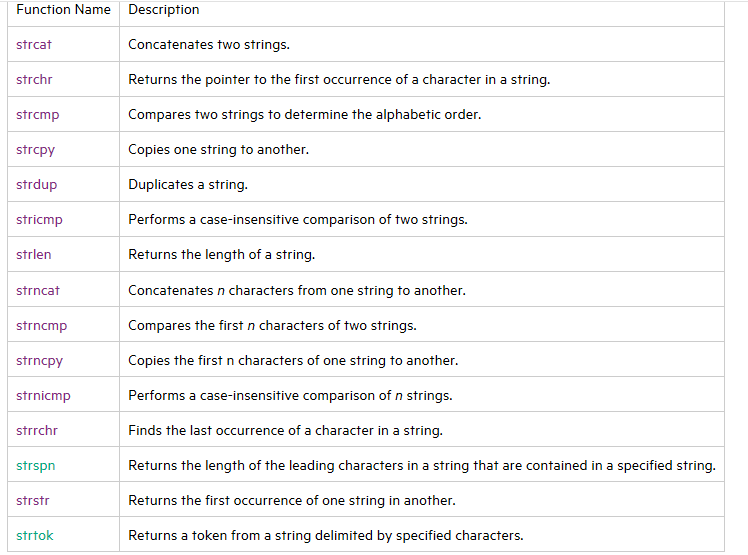根据使用手册内容可见,LR支持的关于String ManipulationFunctions包括:

1、strcat & strncat & strcpy

strcat_strncat_strcpy_Func()
{
char src[50], dest[50];
char fullpath[1024], * filename = "logfile.txt";
strcpy(fullpath, "c:\tmp");
strcat(fullpath, "\");
strcat(fullpath, filename);
lr_output_message ("Full path of file is %s", fullpath);
strcpy(src, "This is source");
strcpy(dest, "This is destination");
strncat(dest, src, 11);
lr_output_message ("the dest string is %s", dest);
return 0;
}

2、strchr & strrchr

strchr_strrchr_Func()
{
char * mystring = "His Excellency the Duke of Exeter";
char * first_x, * last_x;
first_x = (char *)strchr(mystring, 'x');
lr_output_message ("The first occurrence of x: %s", first_x);
last_x = (char *)strrchr(mystring, 'x');
lr_output_message ("The last occurrence of x: %s", last_x);
return 0;
}

3、strcmp & stricmp

strcmp_stricmp_Func()
{
int result;
char tmp[20];
char string1[] = "The quick brown dog jumps over the lazy fox";
char string2[] = "The QUICK brown dog jumps over the lazy fox";
// Case-sensitive comparison区分大小写
result = strcmp( string1, string2);
if(result > 0)
strcpy(tmp, "greater than");
else if(result < 0)
strcpy(tmp, "less than");
else
strcpy(tmp, "equal to");
lr_output_message ("strcmp: String 1 is %s string 2", tmp);
// Case-insensitive comparison不区分大小写
result = stricmp(string1, string2 );
if( result > 0 )
strcpy( tmp, "greater than" );
else if( result < 0 )
strcpy( tmp, "less than" );
else
strcpy( tmp, "equal to" );
lr_output_message( "stricmp: String 1 is %s string 2", tmp );
return 0;
}

4、strncmp

strncmp_Func()
{
int result;
char tmp[20];
char string1[] = "The quick brown dog jumps over the lazy fox";
char string2[] = "The quick brown dog jumps over one lazy fox";
// Perform a case sensitive comparison
result = strcmp(string1, string2);
if (result > 0)
strcpy(tmp, "greater than");
else if (result < 0)
strcpy(tmp, "less than");
else
strcpy(tmp, "equal to");
lr_output_message ("strcmp: String 1 is %s string 2", tmp );
// Compare 30 chars
result = strncmp( string1, string2 , 30);
if (result > 0 )
strcpy(tmp, "greater than");
else if (result < 0)
strcpy(tmp, "less than");
else
strcpy(tmp, "equal to");
lr_output_message ("strncmp: String 1 is %s string 2", tmp);
return 0;
}

5、strnicmp

strnicmp_Func()
{
int result;
char tmp[20];
char string1[] = "The quick brown dog jumps over the lazy fox";
char string2[] = "The quick brown DOG jumps over one lazy fox";
// Perform a case sensitive comparison
result = stricmp( string1, string2 );
if (result > 0)
strcpy(tmp, "greater than");
else if (result < 0)
strcpy(tmp, "less than");
else
strcpy(tmp, "equal to");
lr_output_message ("stricmp: String 1 is %s string 2", tmp);
// Compare 30 chars ,不区分大小写
result = strnicmp( string1, string2 , 30);
if (result > 0 )
strcpy( tmp, "greater than");
else if (result < 0)
strcpy(tmp, "less than");
else
strcpy(tmp, "equal to");
lr_output_message ("strnicmp: String 1 is %s string 2", tmp);
return 0;
}

6、strlen & strncpy

strlen_strncpy_Func()
{
int id, length;
char tmp[1024];
// 8 characters + period + 3 characters + null
char filename[13];
/*下面的strncpy示例创建的文件名符合8.3 DOS文件名格式,即,名称不得超过8个字符,文件后缀的长度必须为3个字符。
创建的文件名格式为[Vuser_id] _apptest.log。 在VuGen中运行示例时,lr_whoami返回的Vuser ID为-1,长度为两个字符。
其余字符“ _apptest”构成的字符超过了所需的8个字符。 strncpy确保仅将8个字符复制到文件名。 最终名称为“ -1_appte.log”。*/
lr_whoami (&id, NULL, NULL);//返回有关执行脚本的Vuser的信息。
sprintf(tmp, "%d_apptest", id);
length = strlen(tmp);
lr_output_message ("name=%s length=%d", tmp, length);
// Copy 8 characters only
lr_output_message("filename=%s", filename);
strncpy(filename, tmp, 8);
filename[8]='�';//这个很重要,手动在数组末尾添加�,实现安全使用strncpy函数,避免不确定性
lr_output_message ("filename without suffix=%s", filename);
strcat(filename, ".log");
lr_output_message ("final filename=%s", filename);
return 0;
}

7、strstr

strstr_Func()
{
int offset;
char * position;
char * str = "The quick brown dog jumps over the lazy fox";
char * search_str = "dog";
position = (char *)strstr(str, search_str);
// strstr has returned the address. Now calculate * the offset from the beginning of str
offset = (int)(position - str + 1);
lr_output_message ("The string "%s" was found at position %d", search_str, offset);
return 0;
}

8、strdup

strdup_Func()
{
int id;
char * groupname_static, * groupname;
/*在此示例中,Vuser的组名将转换为小写。 但是,lr_whoami将组名作为静态缓冲区返回,并且无法使用此类缓冲区。 如果需要操纵,则必须创建静态缓冲区的副本。
strdup创建静态缓冲区groupname_static的副本。 然后将新缓冲区(组名)中的字符转换为小写。*/
// Get the group name from VuGen
lr_whoami (&id, &groupname_static, NULL);
lr_output_message ("groupname=%s", groupname_static);
// Make a copy of groupname_static so we can change it
groupname = (char *)strdup(groupname_static);
groupname = (char *)strlwr(groupname);//将字符串参数groupname转换为小写形式
lr_output_message ("lower case groupname=%s", groupname);
free(groupname);
return 0;
}
Vugen回放输出:

Controller执行输出:

9、strspn

strspn_Func()
{
char * str = "corroborative";
int rc;
if ((rc = strspn(str, "ro")) == 0)
lr_output_message ("No o's or r's found");
else
lr_output_message ("%d of %d characters are an o or an r", rc, strlen(str));
if ((rc = strspn(str + 1, "ro")) == 0)//从orroborative检索
lr_output_message ("No o's or r's found");
else
lr_output_message ("%d of %d characters are an o or an r", rc, strlen(str));
return 0;
}

10、strtok

strtok_Func()
{
char path[] = "c:\mercury\lrun\bin\wlrun.exe";
char separators[] = ".\";
char * token;
/* strtok使用分隔符来查找token之间的中断。 此处的分隔符为“ ”或“.”。
当对同一字符串使用多次调用strtok时,仅在第一次调用时指定该字符串。 后续调用必须将NULL作为字符串参数传递,如下所示。 */
// Get the first token
token = (char *)strtok(path, separators);
if (!token) {
lr_output_message ("No tokens found in string!");
return( -1 );
}
// While valid tokens are returned
while (token != NULL ) {
lr_output_message ("%s", token );
// Get the next token
token = (char *)strtok(NULL, separators);
}
return 0;
}

the end!